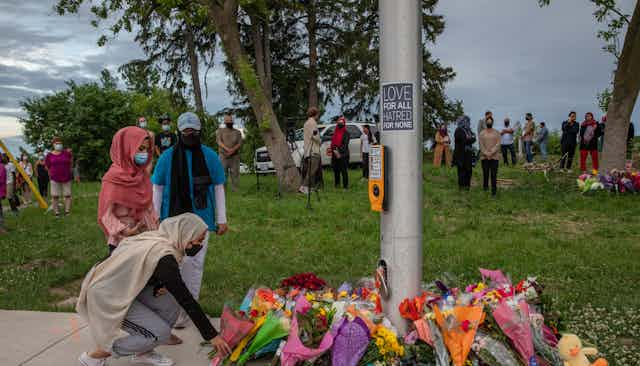This has been a year like no other. The ever-present nature of racial trauma in society has been challenging for all of us, especially children and teens. The COVID-19 pandemic has created a rupture in society, magnifying inequities and redefining what it means to be vulnerable. The violent nature of racism has been on full display on television and in social media.
On June 6, a man struck five members of the Afzaal family with his car in London, Ont. Four members of the family were killed while the youngest was taken to the hospital with serious injuries. The attacker has been charged with four counts of first-degree murder, one count of attempted murder and terrorism.
Read more: The terrorism charge filed in the London attack is the first of its kind in Canada
Children and teens have faced unprecedented challenges from the pandemic to George Floyd’s murder, anti-Asian racism, the discovery of unmarked graves at a former residential school, and now the recent attack on a Muslim family hits too close to home.
Although many parents are worried about what their kids can handle, we cannot shelter them from what is happening around us.
As a child psychiatrist and community activist, I never imagined that my work on healing racial trauma and advancing equity through education would become painfully relevant when a family that I had a personal connection with was murdered a few minutes from my home. Police reported that our beloved friends were targeted for their Muslim faith. It was a crime driven by hate.

Racial trauma is unique
Trauma resulting from racism and anti-Muslim prejudice can be unique. Research from 2018 on the impact of Islamophobia on Muslim children in London, Ont., found that rising anti-Muslim prejudice and demonized narratives about Muslims in the media led to repeated traumatic exposures, resulting in fears of being Muslim in the community.
Despite the pervasive nature of anti-Muslim prejudice in some communities, health-care systems struggle with meeting the needs of Muslim families. The result of our communities silence in the wake of violence driven by prejudice and hate can be re-traumatizing as well.
Sadly, we have seen this type of crime before, yet it is never easy to have a conversation about these topics with kids and teens.
For me personally, it was an entirely different experience to have to explain to my own children that other kids they once played with were targeted for being visibly different.
As we processed our own grief and trauma in diverse ways, I found myself fielding calls and questions from friends and community members about how we can move forward and heal. I drew from my experience and knowledge of evidence and trauma-informed approaches to provide practical, relevant suggestions to help parents and children cope with trauma.
Helping kids deal with trauma
First, adults should work on processing their own grief and traumatic reactions without transferring their emotions on their children. We can role model our own vulnerability, however, we should not impose our reality on our kids. We can remind them they are loved, emphasize that there is a trusting adult to support them, but we must give them space to process their own emotions, however complex or ambivalent they may be.
Second, children and teens should lead us through the kind of conversation they are ready (or not ready) to have. Every family is unique. There is no one way to grieve. There is no one way to heal.
Although we can remind them of our presence, we should not force conversations or take away their agency. Doing so can have the effect of re-traumatizing them and compounding their suffering. We can remind them that we are always available if they need us. When they share how they are feeling, validate their emotions and give them permission to feel without trying to fix anything. Healing is a process, not a checklist.
Third, do not look away. Tell your children the truth and have open conversations. Kids have access to information and can look anything up. Encourage them to ask questions, help them filter the information that the world throws at them and help hold space for them to process their emotions together.

Lastly, encourage them to push back against their fears. This is especially important for families who may have been personally affected by the London attack. Many racialized and visibly Muslim children and adults are afraid to go out of their homes or go for a walk.
Children and teens should be empowered and encouraged to be deliberate and unafraid to be themselves. The process of facing fear itself should always be gradual with kids and teens leading the way. We can encourage them to come outside with us, take walks and make appropriate visits to community sites that foster healing and inspire strength.
Within my family, each one of us is processing what happened in a unique and different way. We recently visited the site where this tragedy happened. We gave ourselves space to process our emotions, ask questions and validate ourselves and one another. We left with a sense of remembrance as we processed our pain and continued our journey towards healing. We will never forget what happened, but we will also step into the future with love, compassion and determination.
We know we cannot ignore the hatred that exists within our world, but we also know that we must remember to find and share light on the darkest days. We can be that light and love for one another. We can find hope, amplify it and share it with ourselves and the world beyond.

